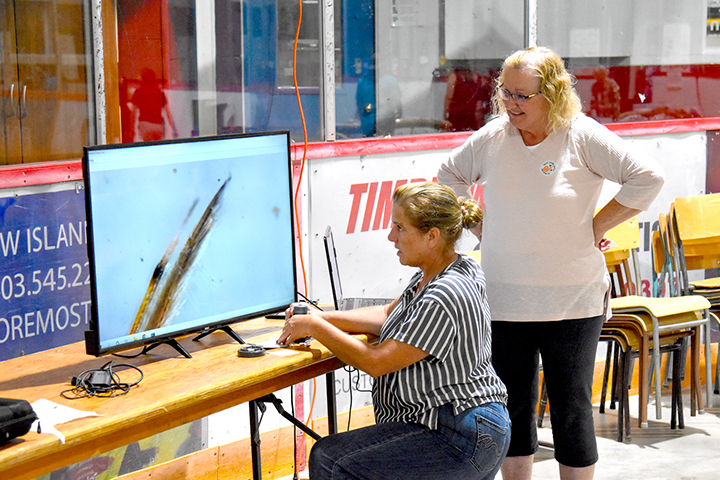Current Temperature
28.6°C
T.R.A.D. CEO shares secrets of the worms at country fair
Posted on July 27, 2023 by Ryan Dahlman Commentator/Courier Photo by Anna Smith
Under the Scope: Roxanne Doerksen shows off some of her work under a microscope at the Pivot Country Fair.
Commentator/Courier Photo by Anna Smith
Under the Scope: Roxanne Doerksen shows off some of her work under a microscope at the Pivot Country Fair.By Anna Smith
Commentator/Courier
Having built her soil empire over the past few years, CEO Roxanne Doerksen shared her passion for what crawls in the earth with Pivot Country Fairgoers at the Servus Community Hall on July 20.
Doerksen began with her own story, how she “retired from her life” in 2016 with full intention of being a domestic partner, but how life took her in the far opposite direction.
“What happened was actually I decided, right at the time the AER was telling farmers, there was a new protocol coming down that farmers might have to pay for the reclamation of their own (land),” said Doerksen. ”We had 11 abandoned wells on our land. And I was like ‘Oh, shenanigans,’ because it would cost about $60,000–$120,000 each. I’m like, ‘I’m cheap. I mean, cost effective. Frugal. I’m gonna go back to school, and I’m gonna go get my tickets so I can go do my own.’ I thought I’m a farmer. I should be able to know how to do this. That shouldn’t be that hard.”
She added, promptly, that she was very wrong, but what she learned became invaluable in short order when her daughter was diagnosed with an autoimmune disease.
“She was 16 years old. And what they do is they basically put her in the bubble, kill off her immune system and hope it really starts and she went and did four rounds of chemo and it didn’t work. And she was a very sick little kid,” said Doerksen. “The traditional drugs that she was doing to try to counteract the side effects for all the chemo that she was going on, wasn’t doing well. And so the internal medicine guy, he’s like ‘you should maybe consider maybe a more holistic or natural approach’.”
While initially resistant, CBD oil seemed an effective approach, and the desire to help others grow cannabis for medicinal purposes was the birthplace of the worm farm, following studies being done south of the border.
These days, Doerksen has thousands of worms in multiple beds throughout her vermicomposting business, and is currently helping to develop further soil amendment technology, when she isn’t speaking on the unique biology of the gut of her beloved red wiggler worms that make up much of her beds.
“So why is the gut of the worm so incredibly important? They are the only extract…on the planet of any organism that doesn’t have a pathogen ever,” said Doerksen. And one of the things that we’re trying to figure out why this is so incredibly important is can we take stuff that is pathogenic, feed it to worms, and have the outcome not have any pathogens in it? Because that is an incredibly interesting thing.”
Due to how fine the particles the worm ingests are, this allows them to grind things such as E. Coli down into their baser components, and have the waste product be comparatively inert.
There are roughly 6,000–8,000 species of worm, said Doerksen, and none of them are native to southeastern Alberta, though there are many naturalized species. However, for her business, she relies on red wigglers, as a bed of roughly 1,500 worms can break down a pound of compost within a single day, and can live as long as six years.
“One of the big things is we wanted to learn how to help farmers like me, who are capital conservative, not cheap capital conservative, how we can make our own waste help our soil. And so that’s one of the big ticket items that we’re doing for the research as part of our research project this year,” said Doerksen.
For those looking to start their own, small worm beds, Doerksen added that the red wigglers need at least six inches of soil to live in, with roughly 60 per cent humidity, and to never feed them beans unless they’re cooked, which she had to learn the hard way after getting a truckload of contaminated beans from Bow Island.
“What I didn’t know is that they have an enzyme called leptin. And that’s what gives you tummy aches and makes the party when you eat too many beans when you’re not used to it. Well, worms can’t process that. So it was quite the thing. So I went down to the beds, and I opened the door and there were worms everywhere. Because the worms were basically exploding, we probably lost a million worms that day,” said Doerksen. “Now we compost any beans we get, first.”
Leave a Reply
You must be logged in to post a comment.

